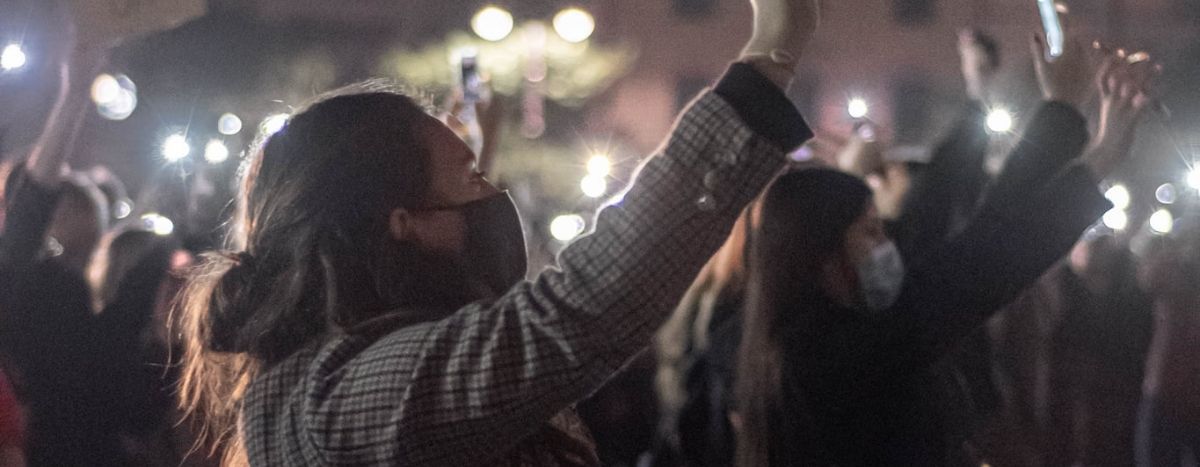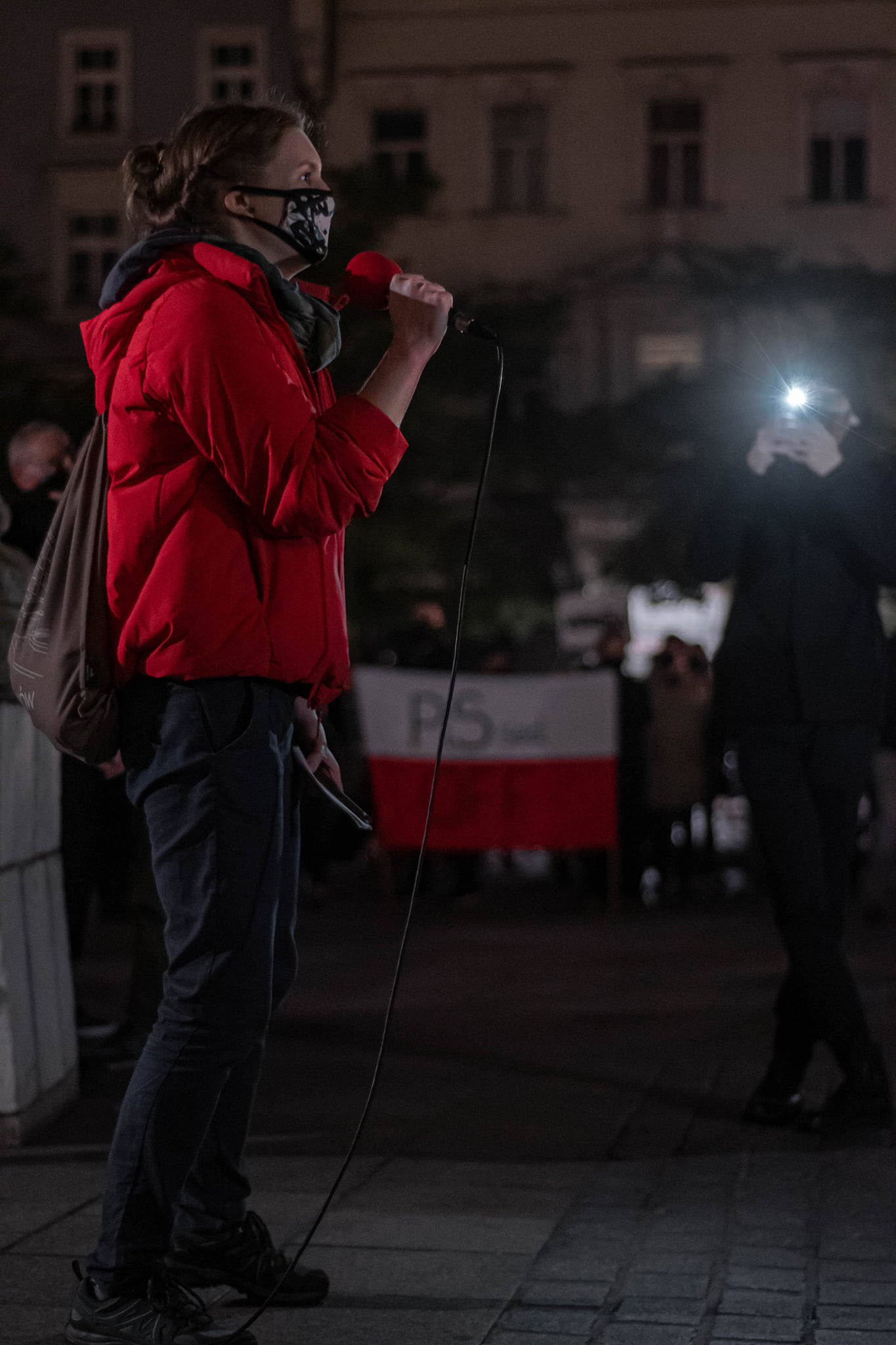
Poland: the fight for abortion rights continues
Published on
Translation by:
 Rebecca Thomson
Rebecca Thomson
On 22 October Poland's Constitutional Tribunal dealt a severe blow to women’s rights. The institution ruled that abortion in cases of “severe and irreversible abnormalities of the foetus” was incompatible with the country's constitution. This announcement enraged thousands of citizens who have been protesting tirelessly against their government and clergy ever since. We interviewed Weronika Śmigielska, one of the demonstrators, who has been fighting for women’s rights in Poland for several years. She filled us in about what's been going on over the past few days.
Despite multiple attempts to tighten abortion laws in 2016 and 2018, Poland's feminist movements have nevertheless had some success in silencing the country's most conservative camps. This all changed, however, when the Constitutional Tribunal, a judicial organ that is closely linked to the government, ruled that abortion was unconstitutional in cases of foetal abnormalities. As a result, as things stand, women are only able to access abortion service in cases of rape, incest, or where the mother’s life is in danger. In 2019, 98% of legal abortions in Poland were related to foetal abnormalities. It was already almost impossible to access abortions in Poland. Now there is a danger that this service will become virtually inexistent.
Ahead of a nationwide general strike, which took place on Wednesday 28 October, we spoke to Weronika Śmigielska, an activist who has been campaigning for several years in Krakow to defend women’s rights and secure wider access to abortion.
Can you introduce yourself in a few words?
My name is Weronika, I’m 30 years old and live in Krakow. I’ve been involved in a number of citizen and feminist initiatives since 2013. For several years I was a member of the organising committee of Manifa, the demonstration for women’s rights on the 8 March in Krakow. Last year I became involved in the pro-choice movement, to facilitate access to abortions in Poland.
What was your reaction when you heard the decision by the Constitutional Tribunal?
On Thursday (22 October) I was glued to the live broadcast for four or five hours. I hoped up to the very last moment that they wouldn’t do it, because, faced with the growth of the women’s movement, the Polish government had been holding back a little recently. Given the court is mostly elected by the ruling coalition PiS (Law and Justice), though, were knew this issue was at risk there. Still, I had a little bit of hope. When they finally announced the verdict at 15:30 I was exhausted and angry, but I already knew we were going to mobilise in front of the ruling party's local headquarters.
There have been several bills to tighten abortion restrictions in recent years. Now, finally, there is a court ruling. What does this timeline look like?
Abortion bills were presented to the Parliament in 2016 and 2018. Every time it was on the Parliament’s agenda, though, we rallied against it. There were huge demonstrations and the bill ended up being put on the back burner as the committee never met to discuss it. We were waiting for the bill to reappear to come back together again. Then, in 2017, a group of parliamentarians submitted this question to the Constitutional Tribunal, to ask whether access to abortion in cases of foetal abnormalities was in accordance with the constitution. In the meantime, elections took place and a group of 119 parliamentarians re-submitted this question to the court. The process is particularly clever because it is very quick. The court meets, votes and there is no legislative procedure. There is no option to withdraw the bill.
This is a political decision, not a judicial one. The discussion that took place was full of emotive arguments, drawing on manipulative terms such as “unborn babies”, “murders”, and so on. It wasn’t a discussion about the law or the logistics of the constitution. This was purely political. By going through the Constitutional Tribunal, the political parties are trying to escape responsibility for this decision as they can say the court decided, not them. They pretend that there’s a barrier between the judiciary and the legislative branch, but this isn’t true.

What is the next step following the court’s decision?
The court’s verdict only comes into force at the time of its publication in the Dziennik Ustaw (Journal of Laws of the Republic of Poland). This is why the opposition is now trying to put pressure on the government not to publish it.
Up to this point what restrictions have existed on the three cases in which abortion is allowed?
Doctors, physicians and pharmacists can sign a conscience clause which says that performing such a procedure is against their ethical beliefs. The law dictates that in such an instance the doctor is obliged to inform the patient about another facility that might offer the service. This is not the case. In Poland there is a whole region in which there is not a single hospital with a doctor that has not signed a conscience clause. Moreover, to access an abortion on the basis of an abnormality, you had to have screening tests and there were already problems with this system. Some doctors were afraid these tests would show that a pregnant person was entitled to an abortion.
It's important to emphasise that this judicial system is constructed on the basis that no pregnant individual ever suffers legal consequences. The mother is never accused. It is the doctors, who could help them access the procedure, that are in danger. These laws therefore aim to leave the mother totally alone.
See also: Abortion in Poland: My body, your country, my choice?
Is this moment different from the ‘Black Friday’ marches in 2018?
I think there's been a drastic change. The Black Friday marches were far less anti-clerical in nature. Now, just this weekend, action was taken in and around the churches. Women and protest groups went to demonstrate inside the churches during mass in many cities. That's already a big change. Before, when we saw similar actions, they were marginal. Now there’s a wave of these types of demonstrations.
Are there many men among the protestors?
It’s difficult to say. I think they are fairly present. This time the revolt is not conceived so much as a feminist activity. Instead it is a protest against the dominance of the Catholic Church in political and social life. Women are certainly at the head of the movement. Men have to learn that they are not always going to be leaders. But they march alongside us.
Is there a strong movement in Krakow, and other smaller cities?
Back when we organised demonstrations in Krakow, eight years ago, they were comprised of highly educated people, generally from militant or progressive backgrounds. Nowadays we see many more demonstrations, even in small towns and villages. Some places that have never had demonstrations before are seeing hundreds of people go out to protest. There have been demonstrations in places like Środa Wielkopolska, for example, which has a population of just 22,000.
In Krakow a lot of people gathered during the Black Friday marches. I remember the change in April 2016 which was caused by another movement Dziewuchy Dziewuchom ('Gals for Gals') after the first alteration to the anti-abortion law. This was the first big mobilisation; I was impressed that we had gathered 2,000 people like that in Krakow. In October of the same year, with the women's general strike, it was 15,000 I think. The figures went up very quickly.
What are the plans for the coming days?
As we speak (26 October) there's a 'blockade' of the city. Slowly but surely, people are announcing where to gather in order to stop the traffic in the centre, and this is happening in other cities as well. Wednesday is the general strike and there are some unplanned actions which will take place more spontaneously. There are a lot of people who are trying to raise awareness on social networks. Activists are writing the number of the association Aborcja Bez Granic (Abortion Without Borders), which launched in December last year, everywhere. This is a group of international organisations that helps people who want to have an abortion, for example by providing medication (pills etc). It also informs people how to have a surgical abortion abroad, sometimes helping women that require financial aid.
Is the freedom to protest being respected at the moment?
In Krakow there have been no acts of violence by the police so far. In Warsaw, though, the mobilisation of security around the Prime Minister's house is already incomparable to anything I've seen before. They came from all over the region, I think, so as not to let the demonstrators, who were there in huge numbers, get through the gates. Over the weekend there were several cases of police violence, in which they used tear gas. A member of parliament was attacked in Katowice yesterday. The police knocked him down and put handcuffs on him, while people shouted that he was a politician. After a while they let him go.
Police reactions have become more and more aggressive in recent months, especially following the arrest of queer activists this summer. Now we're really seeing them use force against peaceful demonstrations. There's also the fact that people are being arrested without anyone knowing where they're being taken. They release people after 24 hours, and there have been cases of violence and ill-treatment in police stations.
Do you think the government will give in?
I don't know what it will take. But I'm sure this is the closest we've ever come to changing the government. The problem for me is that the previous, more liberal, government didn't want to talk about the freedom of abortion rights either, so it's really a matter of launching a new debate, a new initiative around these laws. Still, the question of how the protests are going to affect the current government, and who will be in power after these events is a mystery to us.
Cover image : © Aleksandra Niemiec
Translated from Pologne : se battre pour le droit à l'avortement


